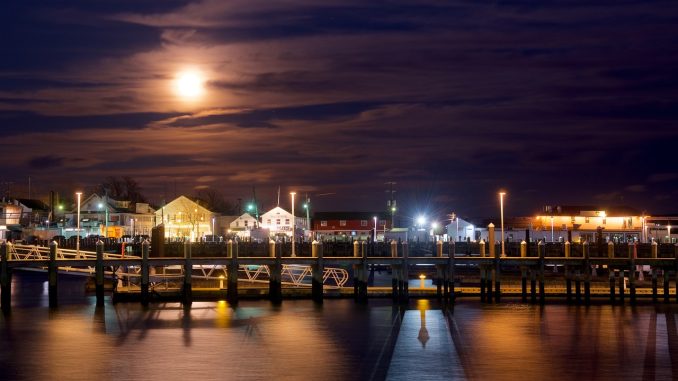
In so many ways, the issues Greenport Village is facing — from affordable and workforce housing, to the challenges confronting small businesses in a tourist economy, to hiring and retaining critical employees to dealing with climate change — are the same across the region. There is not a town, village or hamlet on the entire East End that is not staring down the very same concerns.
That is one reason we decided to relaunch our series of Times Review Talks panel discussions — which were suspended during the pandemic — with a forum on the Future of Greenport. Our Thursday event — which will be covered on our websites and in next week’s papers — is intended to mimic the New England town meetings of the past, where citizens sat in the same room with elected officials to discuss the critical concerns of the day and how to deal with them.
On just one of the many issues up for discussion Thursday — sea level rise and how it will affect the waterfront in coming years — Greenport has some hard decisions to make. So do Southold and Riverhead.
Downtown Riverhead has seen flooding along the Peconic riverfront that has approached buildings and businesses on Main Street. Parts of New Suffolk have — in just the past two months — seen unusually high tides that encircled the homes on Kimogenor Point.
During one recent high tide, bay water spilled over the New Suffolk Beach, nearly reaching Jackson Street. A block beyond that is a string of businesses and a busy restaurant.
Greenport has seen similar flooding. In the village — where voters and elected officials continue to debate the future of the working waterfront — higher tides and rising sea levels appear to present a set of existential challenges.
The rich history of the village and its waterfront presents a different set of issues. Greenport was once the site of a thriving fishing industry, with a large icehouse just up the street from the harbor and with a host of related businesses that kept the fleet afloat. The icehouse is long gone, and today Mark Phillips represents the last of the offshore transient commercial fishermen based in Greenport.
At Thursday’s forum, panelists will also address the vexing challenge of affordable housing, which in many ways lies at the heart of so many other issues impacting the region’s future.
Last year, Southold Town officials discussed whether to continue to allow short-term rentals, which they said discourages badly needed year-round housing. Greenport is also debating this issue, along with the idea of allowing the creation of accessory dwelling units that homeowners could rent out.
Village and town officials are walking a tightrope: how to grow a tourist-based economy while accounting for the negative impacts of additional hotel construction and expansion amid the persistent and critical lack of housing where essential seasonal and year-round workers can afford to live in.
How can potential developers build affordable housing within communities that don’t want those units in their backyards? Can a developer build such housing at a cost that is feasible for both builder and buyer?
Beyond these issues are many others. In our weekly Southold police blotter, we see more frequent references to the working poor camped in cardboard shacks. Last year, CAST was called upon to distribute some 400,000 meals to its clients. School enrollment continues to decline in most North Fork districts
And there are lingering and troubling law enforcement issues. Last fall, for example, a Greenport man was one of seven North Fork residents indicted as part of a sweeping countywide narcotics investigation.
And earlier this year, a Greenport couple with a toddler at home was arrested after police allegedly found 234 grams of fentanyl and 44 grams of cocaine stored in a kitchen cabinet.
There is indeed a lot to talk about. But where there’s constructive, inclusive dialogue, there is always hope. We look forward to keeping the conversations going.

